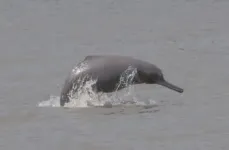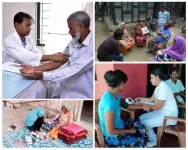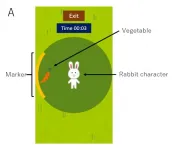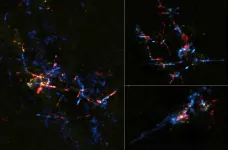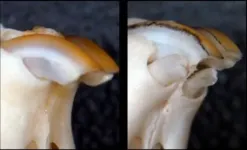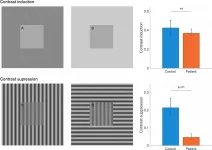"Unsurprisingly, there is weaker support for tougher regulations, such as import restrictions on certain goods. But our study shows that there is broad support in general, including for certain policies that have real potential to reduce imported deforestation," says Martin Persson, Associate Professor of Physical Resource Theory at Chalmers University of Technology.
Previous research from Chalmers University of Technology has already shown the EU's great impact in this area. More than half of tropical deforestation is linked to production of food and animal feed, such as palm oil, soybeans, wood products, cocoa and coffee - goods which the EU imports in vast quantities. The question is, what can the EU do to reduce its contribution to deforestation?
"This issue is particularly interesting now, as this year the EU is planning to present legislative proposals for reducing deforestation caused by European consumption. The question has been discussed by the EU since 2008, but now something political is actually happening," says Simon Bager, a doctoral student at the Université Catholique de Louvain, Belgium, and lead author of the study.
The authors of the article mapped 1141 different proposals, originating from open consultations and workshops, where the EU has collected ideas from companies, interest groups and think tanks. The researchers also compiled proposals from a large number of research reports, policy briefs and other publications, where different stakeholders have put forward various policy proposals. After grouping together similar proposals, they arrived at 86 unique suggestions.
Two suggestions stand out from the crowd
Finding proposals for measures that would have the desired effect but are also possible to implement in practice, and enjoy the necessary political support, is no easy task. But after their extensive survey, the researchers identify two policy options in particular which show promise. The first is to make importers of produce responsible for any deforestation in their supply chains, by requiring them to carry out the requisite due diligence.
"If the importing companies' suppliers have products that contribute to deforestation, the company may be held responsible for this. We consider such a system to be credible and possible to implement both politically and practically - there are already examples from France and England where similar systems have been implemented or are in the process thereof," says Simon Bager.
"Due diligence is also the measure which is most common in our survey, put forward by many different types of actors, and there is broad support for this proposal. However, it is important to emphasise that for such a system to have an impact on deforestation, it must be carefully designed, including which companies are affected by the requirements, and which sanctions and liability options exist."
The other possibility is to support multi-stakeholder forums, where companies, civil society organisations, and politicians come together to agree on possible measures for ridding a supply-chain, commodity, or area, of deforestation. There are positive examples here too, the most notable being the Amazon Soy Moratorium from 2006, when actors including Greenpeace and the World Wide Fund for Nature gathered with soy producers and exporters and agreed to end soy exports from deforested areas in the Amazon rainforest.
"Examples such as these demonstrate the effect that multi-stakeholder forums can have. And in our opinion, it is a measure that is easier to get acceptance for, because it is an opportunity for the affected parties to be directly involved in helping design the measures themselves," says Martin.
Such discussions can also be adapted to the relevant areas or regions, increasing the likelihood of local support for the initiatives.
A delicate balance
The researchers also investigated how to deal with the trade-off between policy impacts and feasibility. An important part of this is combining different complementary measures. Trade regulations on their own, for example, risk hitting poorer producing countries harder, and should therefore be combined with targeted aid to help introduce more sustainable production methods, increasing yields without having to resort to deforestation. This would also reduce the risk of goods that are produced on deforested land simply being sold in markets other than the EU.
"If the EU now focuses on its contribution to deforestation, the effect may be that what is produced on newly deforested land is sold to other countries, while the EU gets the 'good' products. Therefore, our assessment is that the EU should ensure that the measures introduced are combined with those which contribute to an overall transition to sustainable land use in producing countries," says Simon Bager.
In conclusion, the researchers summarise three essential principles needed for new measures, if the EU is serious about reducing its impact on tropical deforestation.
"First, enact measures that actually are able to bring about change. Second, use a range of measures, combining different tools and instruments to contribute to reduced deforestation. Finally, ensure the direct involvement of supply chain actors within particularly important regions, expanding and broadening the measures over time," concludes Simon Bager.
The authors hope that the research and identified policy options can serve as inspiration for policy makers, NGOs, industries, and other stakeholders working to address the EU's deforestation footprint. With at least 86 different unique alternatives, there is a wide range of opportunities to focus on the problem - very few of these are political 'non-starters' or proposals which would have no effect on the issue.
The full study, Eighty-six EU policy options for reducing imported deforestation is available open-access in the journal One Earth.
For more information, contact:
Martin Persson, Associate Professor, Physical Resource Theory at Chalmers University of Technology, martin.persson@chalmers.se, +46 31 772 2148
Simon Bager, Ph.D. candidate UCLouvain and MSCA fellow COUPLED, simon.bager@uclouvain.be, +45 2721 7414
More detailed information regarding how the study was conducted:
To investigate the potential impact and political feasibility of the 1141 proposals, the researchers first categorised them based on who submitted the proposal, who the policy would affect, and what type of policy is proposed. Since many of the proposals were essentially the same or similar, they were then summarised, resulting in 86 unique suggestions. The majority are based on weaker measures, such as making more information and types of support available to producers, rather than statutory restrictions and regulations on imports and exports. The researchers interpret this as meaning that there is greater support for softer proposals. However, the researchers themselves consider these proposals to be less effective.
"One example is eco-labelling, where the purpose is to influence consumers to stop buying products that contribute to deforestation. The intent is good, but previous research does not support the argument that this changes consumer behaviour to such a level that production itself is affected. But if import restrictions are instead introduced on goods that are linked to deforestation, it is already known that this has direct effects," says Martin Persson.
After evaluating the likely effects, the next step was to see which proposals could actually receive political support, and how complex and costly the formulation and implementation was likely to be. For this evaluation, methodological innovations were required.
"After categorising the 1141 proposals, we could see how many stakeholders, and of which kind, proposed a certain type of measure. If the same option was proposed by many actors, of different kinds - environmental organisations, companies, and authorities - we interpreted that as strong, broad support for the proposal," explains Martin Persson.
The last two steps in the assessment of the measures were then about how complicated and expensive it would be to realise the proposals.
"For example, commissioning a research institute to investigate, at a detailed level, what drives deforestation - that would be quite easy. But a new tax or punitive duty at EU-wide level would be very difficult and costly to successfully implement. There are some measures, which the EU can take alone, while others require cooperation with the individual member states or third countries. And there we simply rated the institutional difficulty for implementation of each proposal," says Simon Bager.
The last aspect for assessing the political feasibility was looking at the economic impact of the proposal.
"If you influence a large import flow, that will result in major economic consequences. Directing the EU aid budget to support less forest-intensive production, meanwhile, would have a significantly smaller financial impact," says Martin Persson.
The consequences for the economy also depend on how much of a market is affected. It is important that a will to change taxation or regulation in the area exists.
INFORMATION:

